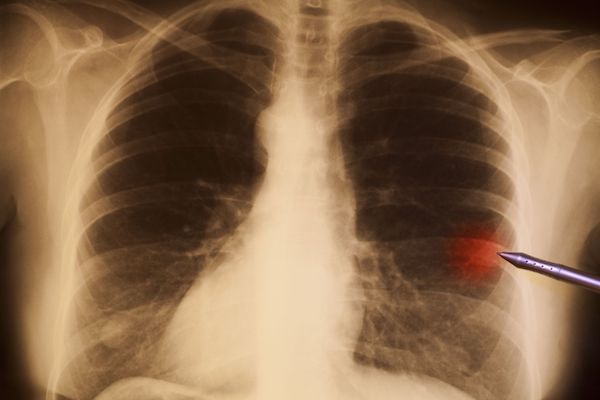Lung cancer is the uncontrolled growth of abnormal cells in one or both lungs.

Lung cancer incidence is extremely common worldwide. Lung cancer in South Africa is the second most common cancer in men and the sixth leading cancer in women, according to the Cancer Association of South Africa (CANSA).
Lung cancer causes include tobacco smoking – the risk increases with the number of cigarettes smoked and how long the person has smoked – as well as passive or second-hand smoking. About 60 percent of all lung cancer deaths in South Africa are due to tobacco smoking and over eight percent of all deaths are due to smoking.
Other known causes of lung cancer include breathing in second-hand tobacco smoke, domestic and industrial pollution.
Many lung cancers start in the cells lining the interior passages of the lungs and are called carcinomas of the bronchus (bronchogenic carcinomas).
There are three main types of lung cancer. Knowing which type you have is important because it affects treatment options and prognosis. Lung cancer types are:
- Non-small cell lung cancer
- Small cell lung cancer
- Lung carcinoid tumour.
What are its symptoms?
Lung cancer can be hard to detect early because it often doesn’t reveal symptoms until it is advanced. When lung cancer symptoms do start to appear, they are usually caused by blocked breathing passages or the spread of cancer further into the lung, surrounding structures, or other parts of the body.
Lung cancer signs or symptoms include:
- A chronic cough
- Breathlessness and wheezing
- Coughing up blood-stained sputum
- Pain when coughing or breathing deeply
- Loss of appetite
- Weight loss
- Respiratory infections
- Swelling of the neck and face
- Pain and weakness in the shoulder, arm, or hand
- Fatigue and weakness
- Fever, headaches, body pain.
It is crucial to catch it early as lung cancer can also spread to other parts of the body, such as bones, the liver, adrenal glands or the brain.
How is it diagnosed?
A lung cancer diagnosis should be suspected when a person with a heavy smoking history presents with a cough, weight loss and finger clubbing. Your doctor will give you a thorough physical exam and ask you about your medical history. If he/ she suspects lung cancer, a lung cancer test is needed to confirm the diagnosis.
Test types include:
- Imaging tests: An X-ray image of your lungs may reveal an abnormal mass or nodule. A CT scan may reveal small lesions in your lungs that might not show up on an X-ray.
- Sputum cytology: Examining sputum under the microscope can reveal the presence of lung cancer cells.
- Tissue sample (biopsy): A sample of abnormal cells is removed for testing either by fine needle biopsy or via bronchoscopy.
Stages of lung cancer range from I to IV, becoming more severe and invasive as it progresses. By stage IV, the cancer has spread beyond the affected lung to the other lung or to distant areas of the body. Early detection of lung cancer is crucial for a positive prognosis.
What are your treatment options?
Once diagnosed, you will be assigned a multidisciplinary healthcare team, which will guide you through your cancer treatment and outline your options. Ask questions and think about all your options before deciding on your treatment.
Lung cancer treatment depends on the type and how advanced the cancer is, as well as overall health and treatment preferences.
The main types of treatment for lung cancer are:
- Surgery: During surgery, your surgeon works to remove the lung cancer and a degree of healthy tissue. Lymph nodes may also be removed from your chest to check them for signs of cancer.
- Chemotherapy: Lung cancer drugs are used to kill cancer cells.
- Radiation therapy: Radiation therapy uses high-energy beams to destroy the cancer cells.
- Targeted drug therapy: These are newer cancer treatments that work by targeting specific abnormalities in cancer cells.
Can it be prevented?
Lung cancer prevention is not possible, but there are precautions you can take that could lower your risk. These include:
- Not smoking
- Avoiding heavy alcohol drinking
- Avoiding carcinogens
- Avoiding exposure to second-hand smoke
- Avoiding cancer-causing agents (such as radon, asbestos, arsenic, chromium, nickel and tar)
- Eating plenty of fruit and vegetables
- Exercising regularly.
For more info
Cancer Association of South Africa
IMAGE CREDIT: 123rf.com
